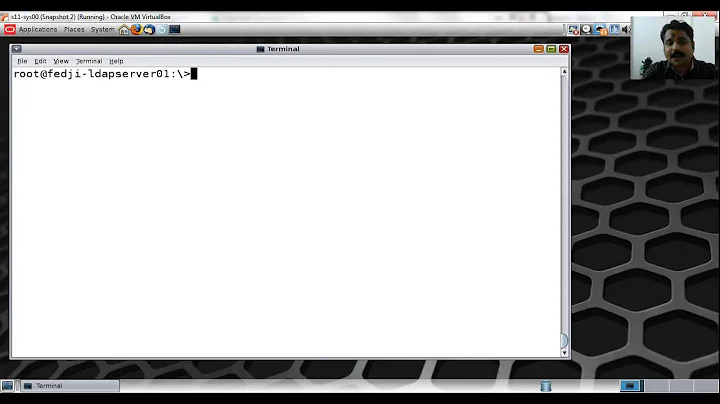what is the simple Command to check password expiry time of an openldap user account
Solution 1
There isn't one. The only thing that can help you is the operational attribute pwdChangedTime, which you can see via ldapsearch. When this gets older than pwdMaxAge in the password policy, the password expires. The only way to test it exactly is to wait out the expiration periond.
Solution 2
I've found an amazing resource out there: checkLdapPwdExpiration.sh that might come very helpful for you.
Here below a shortened version of such amazing script, that works for my configuration
#!/bin/sh
MY_LDAP_HOSTURI="ldap://localhost:389"
MY_LDAP_ROOTDN="cn=Manager,dc=example,dc=com"
MY_LDAP_ROOTPW="qwerty"
MY_LDAP_DEFAULTPWDPOLICYDN="ou=Policies,dc=example,dc=com"
MY_LDAP_SEARCHBASE="ou=users,dc=example,dc=com"
MY_LDAP_SEARCHFILTER="(&(uid=*)(objectClass=inetOrgPerson))"
MY_LDAP_SEARCHSCOPE="one"
MY_LDAP_SEARCHBIN="/usr/bin/ldapsearch"
MY_LDAP_NAME_ATTR=cn
MY_LDAP_LOGIN_ATTR=uid
MY_GAWK_BIN="/usr/bin/gawk"
# Retrieves date in seconds.
# This function could take one parameter, a time returned by the command
# `date +"%Y %m %d %H %M %S"`. Without parameter, it returns GMT time.
getTimeInSeconds() {
date=0
if [ "$1" ]; then
date=`TZ=UTC ${MY_GAWK_BIN} 'BEGIN { \
if (ARGC == 2) { \
print mktime(ARGV[1]) \
} \
exit 0 }' "$1"`
else
now=`date +"%Y %m %d %H %M %S" -u`
date=`getTimeInSeconds "$now"`
fi
echo ${date}
}
## Variables initialization
tmp_dir="/tmp/$$.checkldap.tmp" ; result_file="${tmp_dir}/res.tmp.1" ; buffer_file="${tmp_dir}/buf.tmp.1"
ldap_param="-x -LLL -H ${MY_LDAP_HOSTURI}" ; mkdir ${tmp_dir}
[ ${MY_LDAP_ROOTDN} ] && ldap_param="${ldap_param} -D ${MY_LDAP_ROOTDN} -w ${MY_LDAP_ROOTPW}"
## Performs global search
${MY_LDAP_SEARCHBIN} ${ldap_param} -s ${MY_LDAP_SEARCHSCOPE} \
-b "${MY_LDAP_SEARCHBASE}" "${MY_LDAP_SEARCHFILTER}" \
"dn" | grep -iE '^dn:' > ${result_file}
while read dnStr # Loops on results
do
[ ! "${dnStr}" ] && continue # Do not use blank lines
dn=`echo ${dnStr} | cut -d : -f 2` # Process ldap search
${MY_LDAP_SEARCHBIN} ${ldap_param} -s base -b "${dn}" \
${MY_LDAP_NAME_ATTR} ${MY_LDAP_LOGIN_ATTR} pwdChangedTime pwdPolicySubentry \
> ${buffer_file}
login=`grep -w "${MY_LDAP_LOGIN_ATTR}:" ${buffer_file} | cut -d : -f 2 \
| sed "s/^ *//;s/ *$//"`
name=`grep -w "${MY_LDAP_NAME_ATTR}:" ${buffer_file} | cut -d : -f 2\
| sed "s/^ *//;s/ *$//"`
pwdChangedTime=`grep -w "pwdChangedTime:" ${buffer_file} \
| cut -d : -f 2 | cut -c 1-15 | sed "s/^ *//;s/ *$//"`
pwdPolicySubentry=`grep -w "pwdPolicySubentry:" ${buffer_file} \
| cut -d : -f 2 | sed "s/^ *//;s/ *$//"`
[ ! "${pwdChangedTime}" ] && continue
[ ! "${pwdPolicySubentry}" -a ! "${MY_LDAP_DEFAULTPWDPOLICYDN}" ] && continue
# Retrieves user policy pwdMaxAge and pwdExpireWarning attributes
ldap_search="${MY_LDAP_SEARCHBIN} ${ldap_param} -s base"
if [ "${pwdPolicySubentry}" ]; then
ldap_search="${ldap_search} -b ${pwdPolicySubentry}"
else
ldap_search="${ldap_search} -b ${MY_LDAP_DEFAULTPWDPOLICYDN}"
fi
ldap_search="$ldap_search pwdMaxAge pwdExpireWarning pwdMinLength pwdInHistory"
pwdMaxAge=`${ldap_search} | grep -w "pwdMaxAge:" | cut -d : -f 2 \
| sed "s/^ *//;s/ *$//"`
pwdExpireWarning=`${ldap_search} | grep -w "pwdExpireWarning:" | cut -d : -f 2 \
| sed "s/^ *//;s/ *$//"`
pwdMinLength=`${ldap_search} | grep -w "pwdMinLength:" | cut -d : -f 2 \
| sed "s/^ *//;s/ *$//"`
pwdInHistory=`${ldap_search} | grep -w "pwdInHistory:" | cut -d : -f 2 \
| sed "s/^ *//;s/ *$//"`
[ ! "${pwdMaxAge}" ] && continue
# Retrieves time difference between today and last change.
if [ "${pwdChangedTime}" ]; then
s=`echo ${pwdChangedTime} | cut -c 13-14`
m=`echo ${pwdChangedTime} | cut -c 11-12`
h=`echo ${pwdChangedTime} | cut -c 9-10`
d=`echo ${pwdChangedTime} | cut -c 7-8`
M=`echo ${pwdChangedTime} | cut -c 5-6`
y=`echo ${pwdChangedTime} | cut -c 1-4`
currentTime=`getTimeInSeconds`
pwdChangedTime=`getTimeInSeconds "$y $M $d $h $m $s"`
diffTime=`expr ${currentTime} - ${pwdChangedTime}`
fi
expireTime=`expr ${pwdChangedTime} + ${pwdMaxAge}`
expireTimeMail=`date -d @$expireTime "+%s"` ; now=`date +%s`
expireDays=`echo $(( (${expireTimeMail} - ${now} )/(60*60*24) ))`
if [ ${currentTime} -gt ${expireTime} ]; then
echo "Password expired for: ${login}" ; continue
else
echo "Password will expire for: ${login} in ${expireDays} days" ; continue
fi
done < ${result_file} ; rm -rf ${tmp_dir} ; exit 0
NB: it may occurs that new password policies are not enforced immediately and you might need to wait for a password change for them to be effective.
Related videos on Youtube
Dominiqs
Updated on September 18, 2022Comments
-
Dominiqs over 1 year
I am running openldap 2.3.43.el5 on RHEL 5.3 I am trying to find a simple command that will tell you when the password for an ldap user will expire, any help would be greatly appreciated.This would be an equivalent of chage -l (for local linux accounts.
I have just managed to change the pwdmaxAge attribute in our environment and need a definite way to check if the change has taken effect (not just by querying the atribute pwdMaxAge with ldapsearch
Help Please ?
-
Greg Petersen over 11 yearsWhat is your problem with
ldapsearch?
-
-
Dominiqs over 11 yearsThanks very much for your help anyway..i have reset my pwdmaxAge t 90 days , i guess i have to wait until then to see if it worked or not.Thanks
-
user207421 over 11 years@Dominiqs You don't have to wait that long. Make yourself a test password policy with max age 1 day, make a test account with that policy, change its password, wait a day, ...




